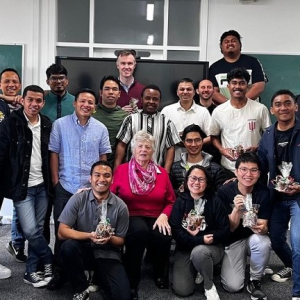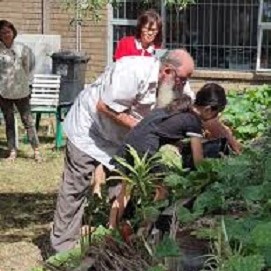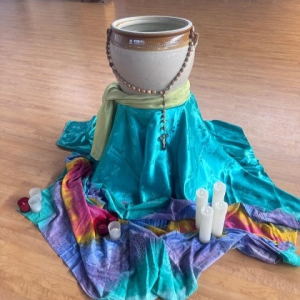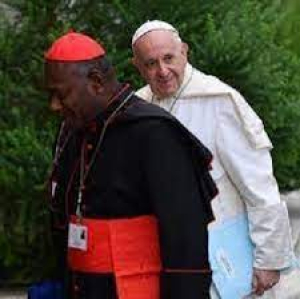Peter MALONE
Continuer/ Keep Going
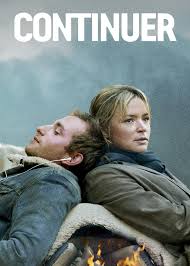
CONTINUER/ KEEP GOING
Belgium, 2018, 84 minutes, Colour.
Virginie Efira, Kacey Mottet Klein.
Directed by Joachim Lafosse.
This is a brief Belgian film, focusing on a relationship between a mother and son.
The context is their travels in Kazikistan, an attempt by the mother to reach out to her older teenage son, having abandoned him earlier and his living with his father. He has had trouble sometimes, and has been accused of attacking a teacher.
The journey takes place in quite exotic settings for the audience to gaze at. And there are various communities in the desert, small villages, friendly tribes, raiders…
And the travel is on horseback.
The son is rather wilful in his treatment of his mother. She is frequently exasperated. While there are some moments when they do bond, there is continual uncertainty, even a dramatic climax and his pulling a gun on his mother.
There is no certain ending, leaving the film for the audience to gauge their response to each of the characters and how the conflict could be resolved.
- The title, a journey, external travel, interior journey?
- A built-in production, the cast, locations in Morocco, standing in for Kajikistan? The musical score? Songs, dancing?
- The journey, the introduction, the desert locations, the horses, mother and son? The development of the relationship? The past, the young mother, abandoning the family, the role of the father, the son growing up, early adulthood, with his father, travel with his mother, choices?
- The audience enjoying the travel, the range of locations, the various encounters, friendly families and hospitality, local raiders, the blacksmith and the ritual traditions with the horses, the village gathering in celebration?
- The portrait of the mother, her age, her intentions, riding the horses, the relationship with her son, love, exasperation, the conversations, the silences, her concern, the target of his bitterness? At the various locations, the son with the people, the mother mediating? The moments of breakthrough, then the resentments? The finale in the village with the injured horse, working with the horse, the meal, the singing and dancing, the son, his anger, returning with the revolver? The confrontation? The continuing of the journey, some kind of reconciliation and understanding? A future?
- The son, age, experience with his father, the father’s condemnation of his mother and her drinking, her absence, his behaviour, uncontrolled, attack on the teacher, going on the travels, listening to the music, ignoring his mother, angry with his mother, the comments, the reminiscences? His bad manners with people, on the travels? The horse, the village and its care for it, the celebration, his drinking, exasperation, returning with the revolver, the threats? Continuing the journey, some possible understanding and reconciliation?
- Audiences identifying with the mother, with the son, understanding, empathy or not, hopes for reconciliation?
I.S.S.

I.S.S.
US, 2023, 95 Minutes, Colour.
Ariana DeBose, Chris Messina, John Gallagher Jr, Masha Mashkova, Costa Ronin, Pilou Asbaek.
Directed by Gabriela Cowperthwaite.
I.S.S. stands for international space station. The film takes place in the near future, building on the rapport between Russia and the United States after the collapse of the Soviet Union.
The audience accompanies two new appointees to the station, played by John Gallagher Jr and Oscar winner for West Side Story, Ariana DeBose. She is involved in medical studies. They meet the American commander, played by Chris Messina, and three Soviet astronauts. They have been trained to survive on the space station and to learn each other’s language to communicate.
The premise of the drama is that war breaks out on earth, each team receives a message to beware of the others and to take over the spacecraft. What follows is some drama, conflict, deceptions, some violent outbursts of mistrust.
This is a film for those who enjoy films in space, thinking back to 2001, A Space Odyssey, and through the decades to more recent films like Gravity, Ad Astra, First Man…
- The title, international Space Station, the initial explanations, bonds between Russia and the US, collaboration in space, scientific and medical investigations?
- The plausibility of the plot, the reality of space stations, Soviet and American alliances, the possibility of war, nuclear disaster and consequences?
- The visuals of the space station and shuttle, the interiors, the exteriors, floating through space, the overview of earth? The musical score?
- Entering into the action, Kira and Christian, the shuttle, their training, English-language, Russian language? Christian and his talk about his family? The arrival, the welcome, adjusting, speaking English, the attempts in Russian? Gordon Barrett, in charge, personality, the welcome, his relationship with moronic? The two Russians, personalities, skills, Liosha and Kira and their shared interest in medical research, the animal specimens, their deaths?
- The work in collaboration, friendliness?
- Kira seeing the eruptions, the vastness, each side receiving messages to take charge, the Americans hesitating, the Russians in action?
- The conflict and strategies, the Russians, stating the antenna was broken, Gordon going out, no breakage, the loss of communications, his going into space, Nikolai and his control, Liosha and his change of heart, bringing Gordon back?
- Weronika, the relationship with Gordon, her upset, her getting Kira on side, to save the new medical research, Kira feeling betrayed, Christian and the attack, her confronting the Russians, the news of Gordon’s death, upset and anger, Christian hitting her, her death? Gordon’s arrival back, grief?
- Christian, talking about his family, taking the research, preparing the shuttle, curate discovering this, the confrontation? The fighting with Nikolai, Nikolai and his sense of duty, the struggle, suspension, each killing the other?
- Liosha and Kira remaining, having to bond, preparing to leave – and not knowing where they would land or what the future will be?
- An addition to space exploration films, memories of Cold War, Cold War reigniting, conflicts, sense of duty, loyalties?
2024, YTU and future Canon Lawyers, end of the year’s studies.
2024, YTU and future Canon Lawyers, end of the year’s studies.
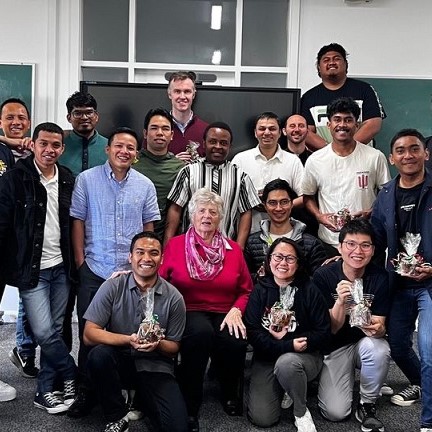
Our MSC students have just completed their academic year at YTU, and now they’re preparing to set out for their pastoral placements in various communities. All the best to them as they bring their learning and passion to serve others in new places during this summer!
P.S. The photo shows the Canon Law class with their lecturer, Brigidine Sister. Rosie Joyce, and classmates – what a top bunch! Trieu MSC reporting - and our sharing this story with our MSC Vocations Australia Facebook page.
Visitors to our site who studied at YTU will be interested to note the international range of the students.
(With Trieu, next to Rosie, we might wonder about favourites!!)

Silver Dream Racer

SILVER DREAM RACER
UK, 1980, 101 minutes, colour.
David Essex , Beau Bridges, Christina Raines, Clarke Peters, Harry H. Corbett, Diane Keane, Lee Montague, T.P. McKenna.
Directed by David Wickes.
Silver Dream Racer is a star vehicle for popular singer of the period, David Essex. He contributes to the score and to the central song which was very popular.
Direction is by David Wickes who had specialised in television more than films for cinema, directing the series The Sweeney as well as the film version. In the 90s he continued in television with some touches of horror with Jack the Ripper, Frankenstein, Jekyll and Hyde.
The story is fairly conventional, an older brother expert with bikes, his death, the younger brother stepping into his place, the family background and relationships, rivalry with an American rider played by Beau Bridges. There is a strong British supporting cast.
However, the main focus of the film is on the racing, footage taken at the Grand Prix of 1979 and incorporated into the film.
- A sports film? Personal interactions film? The conventions, the quality?
- British production, pro-British, the rivalry with the US? The stars, David Essex, singer, actor? The British supporting cast? American stars?
- Effective photography, actual footage from the Grand Prix? Special effects and atmosphere?
- The musical score, David Essex and his reputation, the song?
- The prologue, Nick, his brother, working on the bike, his death? Skill, challenge, the horror of death?
- Nick as a character, his family and relationships, training, in honour of his brother, finding the bike? His brother’s work? Speed, skills, the international atmosphere, Cider and his work, the support team?
- The background, garages, designing, finance, deals, racing, challenge?
- David Essex as Nick, Beau Bridges as Bruce, the rivalry, the clash, the contrasts, the women, relationships? The race, the techniques, the manoeuvres, the ending?
- The family background, Nick at home, Carol, going out, encounters with Bruce, anti-American stances, emotional relationships?
- The main focus on characters, on the race, rivalries – and the drama of the actual racing footage?
And Mrs
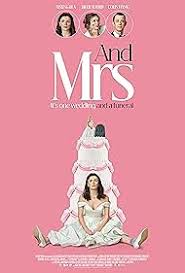
AND MRS
UK, 2024, 111 minutes, Colour.
Aisling Bea, Billy Lourd, Susan Wokoma, Harriet Walter, Sinead Cusack, Peter Egan, Omari Douglas, Samuel Barnett, Paul Kaye, Elizabeth McGovern, Colin Hanks.
Directed by Daniel Reisinger.
Most of us may have to look twice at the title. Is there a misprint? An omission? No, in fact the title is quite accurate. And, if one were looking for a smart title, we might suggest A Post-mortem Romantic Comedy.
While the film is British, the writer is an Australian playwright living in London. And, the director is also Australian. Some audiences may sense a somewhat Australian sardonic tone, the humour in the seriousness.
This is Gemma’s story. She is played by Aising Bear. She is in a relationship with an American, Nathan, played by Colin Hanks. He has proposed. And while she has accepted, the engagement is still on something of an emotional long finger.
There is quite an early twist of the plot, something which advertising and trailers may quickly indicate. However, this review will take the reticent stance.
We spend a lot of time in London, with Gemma, with her close friends, happy flashbacks with Nathan and scenes of a sense of his presence with her all the time, with her parents, who are supportive of her engagement to Nathan and are eager for a happy resolution of the engagement despite Gemma’s hesitations.
Also in the picture are Nathan’s relations, the visit to London from his somewhat wacky sister, Audrey (Billy Lourd, Carrie Fisher’s daughter, in fact) and a visit to the United States to visit their mother, Elizabeth McGovern, a long way from Downton Abbey.
There are some legal difficulties which are pursued throughout the film, especially in approaches to the Chief Justice for various permissions required. And, as a bonus for audiences of British films and television, she is played by Harriet Walter.
Ultimately, there is a happy ending, a wedding ceremony, and we realise what the title means.
- Curiosity about the title? The explanation, engagement, the wedding?
- The British setting, Australian writer and director, humorous tone, satiric tones, romantic tones?
- The structure of the film, the present, the range of flashbacks, building up the picture of Nathan and his relationship with Gemma? His appearances in her imagination?
- A romantic comedy, a post-mortem romantic comedy, marriage and commitment to a dead’s powers? In terms of realism? In terms of imagination and comedy? The background of legal issues and precedents in the UK and France?
- Gemma’s story, her relationship with Nathan, his American background, her life, work, exercises, returning to find Nathan has died? The impact on her, grief, surprise? Her reliance on her best friend, flight attendant with her stories, consolation and support? The response of her parents, their understanding, discussions?
- The issue of the funeral, the arrangements, the messages for Audrey, not picking up her phone, Nathan’s sister, arrival in the UK, thinking it a joke, the reality, vomiting into the Prada bag? Her personality, erratic? Her stories about their mother? Abandoning them? The later visit by Gemma to their mother, her life, conversations, Audrey outside, eventually coming in, the mother’s hard stands, not consenting to the wedding, the later scenes of rethinking, the photo, change of heart?
- The funeral, the speaker, the parody of this kind of speech, Audrey and her attack, ousting him? The effect on everyone?
- The idea of the wedding, the research, the approach to the Chief Justice, the impersonation of the court, sitting in on the prostitution case, the farcical aspects? The application, the letter, the return, the discussions with the Chief Justice, the eager assistant supporting the idea, the continued meetings, her turning down the issue, the legal precedents, her own life? The final meeting, the eventual persuasion, and her seeing herself in a good light?
- Manager of the restaurant for the wedding, his criticisms of Nathan and online rules, the confrontation with Gemma? Agreeing to hold the reception? The final sequence in the middle of the credits at the reception?
- Nathan’s best friend, arriving, no refund for the ticket, his attraction to Gemma’s best friend, together, talking, dancing?
- The gay friend, his support, is officiating at the wedding? Attracted to the Chief Justices assistant?
- The film showing Gemma’s moods, frame of mind, the reappearance is of Nathan, her imagining him, reassessing the engagement, the flashback to the proposal, the reasons for acceptance, her not having the opportunity to explain her commitment to Nathan, the urgency of the quest, the interviews with the Chief Justice, with Nathan’s mother (and going to America with the comedy of the best friend having to go through security so many times)?
- The ultimate ceremony, her hesitations, her mother absent for the moment, the deep commitment, the ceremony, the aftermath and the celebrations and support?
- An offbeat idea, a post-mortem romcom?
Mozart's Sister
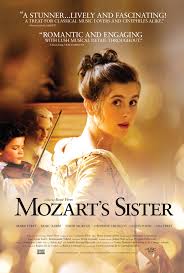
MOZART’S SISTER
Australia, 2024, 98 minutes, Colour.
Directed by Madeline Heatherton-Miau.
One of the points made early in the film is that so many people over the centuries and into the present time are not aware that Wolfgang Mozart had a sister. Let alone that she was a composer and a talented pianist.
This is an international documentary for the new awareness of Maria Anna Mozart. It has been internationally financed including from Screen Australia. And, the documentary, with a variety of talking head experts on music, musicology, history, and handwriting… We are taken to various locations around the world including Australia, Sydney and Darwin, in the US Tucson and New York, Britain, Austria…
The film also has some reconstruction of scenes, the costumes and decor of the 18th century, many portraits, some re-enactments.
The film explains the background of the Mozart family, Leopold Mozart and his skill as a violinist, his love of music, his awareness of the genius of his children, the three and half years of touring Europe, from Austria through Germany, the low countries, France and to London. Both of the children still very young, no sibling rivalry, rather companionship, playing the piano, composing, writing the music, and the young Mozart discovering his talent. There were also times when their father was too sick and they had to imagine the music and to write it down in silence.
For those who love the music of Mozart, there is a great deal on his background, his talent, his place in the family, his marriage, his genius, early death. And, with the help of some historians, with Alma Deutscher, herself a composer, pianist and conductor when young, insights into Maria Anna Mozart. And, practical comments from veteran conductor, Dane Jane Glover.
The film also takes us to the various locations of Mozart’s life, his birthplace in Salzburg with all the tourists, the museums, especially with the manuscripts, to Vienna.
Which makes the film a combination of re-enactment and drama, a presentation of the music, and a masterclass in history, research, the reassignment of the Mozart catalogue, identification of his sister’s compositions, close examination of signatures on writings to test authenticity.
Definitely for classical music lovers but also for a public aware of Mozart – but discovering they need to know something of Maria Anna Mozart, his sister.
Falling into Place
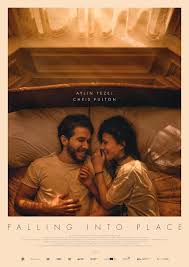
FALLING INTO PLACE
Germany/UK, 2023, 113 minutes, Colour.
Aylin Tezel, Chris Fulton, Alexandra Dowling, Rory Fleck Byrne, Juliet Cowan, Samuel Anderson, Olwen Fouere, Michael Carter, Cian Barry.
Directed by Aylin Tezel.
Perhaps calling Falling into Place romantic comedy suggests that it is a light presentation of a relationship. It is a touch more serious. And, by the end, the two characters, we know, will fall into place.
One of the surprising features of the film is to discover that the writer and the director, Aylin Tezel, is German, and has featured in the number of German films. However, while she brings her German perspective to characters and situations, the setting is British, some scenes on Isle of Skye, some of life in London.
But, even more significantly, Aylin Tezel also plays the central role of hero, an artist, set designer for the theatre, tensions in relationships, insecurities in her own life, getting away from London to the Isle of Skye. On the same train from London, but separately, is Ian, a musician, also getting away from a relationship in London but visiting his parents on Skye.
The different feature of this film is that we spend the first almost 30 minutes sharing the initial encounter of the couple, in a bar, chatting outside, and a gradual development of acquaintance, beginnings of a friendship, sharing talk, confidences, jokiness, competitive running, being comfortable with each other. But, a crisis, Ian having to go home, his sister alienate, attempting suicide.
Then, back in London, for a long section of the film, the story of Kira, the story of Ethan, no connection between the two. The audience sees Kira’s insecurity, fragility in relationships, breakups, yet people confident in her talent for the theatre and her getting an exhibition at a Gallery for her art. The audience also sees Ian’s insecurity, the conversations with a very patient girlfriend, the steps towards breaking up, his work with his music.
There is one of those coincidences, made quite plausible, in which the two characters come together again, a re-acquaintance because they had never expected that they would encounter each other after the time on Skye.
Perhaps more than a happy ending because in those first 30 minutes we saw how compatible Kira and Ian were, so some confidence for the future, everything falling into place.
- A romantic comedy for 30-somethings?
- The contribution of the writer, director, star?
- German perspective? The British settings, the Isle of Skye? London? European? The musical score? The songs?
- The introduction to Kira and Ian, on the train, separate, their brooding, the arrival, Kira at the hotel, at the bar, the situations, the man chatting up Kira, noticing Ian? His going off with the girl? Both outside?
- The scenario of having the two encountering each other, starting to talk, interact, share, click, the running, the different situations, locations, the night passing, comfortable with each other?
- The crisis, Ian going home, the welcome from his mother, the reaction of his father, the news about his sister, in the car, rushing away? Keira and her return to London?
- The focus of the film on the story of each of them? The present, the range of flashbacks, building up the story?
- Keira’s story, her art, the paintings, portrait of Ian? A relationship with Aidan, broken, yet her dependents, meeting him, weeping, his reactions, the separation? Her indecisions, the theatre, the commission from Lewis, meeting the cast? The meeting with Aidan’s friend, leading him on, the sexual encounter, breaking off? Judy, the art gallery, praise for her art? And the continual meeting with her friends, confidantes? The exhibition, praise?
- Ian’s story, in London, the relationship with Emily, open relationship, her tolerance, his treatment of her, his not talking about his sister, gradually opening up, some kind of understanding between them, his breaking with her? The importance of his sister, her suicide attempts, not having seen her for years, change of heart, going to visit, her reaction, the repeat visits, the growing understanding between them? Visiting his mother and father? And his playing the piano?
- The irony of his walking along the street, seeing the white piano, going into play, meeting Judy, apologising, seeing his picture, at the exhibition, encountering Kira again, Kira with the flowers, the talk, the dancing? His leaving, her following him into the street, the kiss, the running…?
- A romantic comedy for an older audience?
Roger Purcell MSC, Movement for a Better World, new book
Roger Purcell MSC, Movement for a Better World, new book
The History of the Movement for a Better World in
Papua New Guinea 1975-2020
Roger Purcell MSC
During his many years in PNG, Roger worked extensively with the Movement for a Better World.
“We want to be a school of inspirers of the Church because the Church is the inspiration of the world, the soul of history... we want to create inspirers of the world, of the Church for a Better World.” [Riccardo Lombardi SJ, School of Prophets]
Here in a nutshell is the inspiration of the Founder of the Movement for a Better World, Fr Riccardo Lombardi SJ.
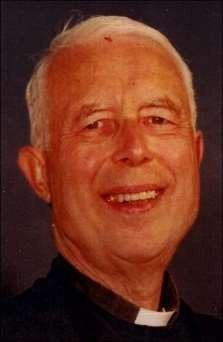
This work is essentially a record of the work of the Movement for a Better World in Papua New Guinea from 1975 onwards. It is not intended as an academic historical work. It records the history of this Movement and the people in it and will be of interest to those who became part of the movement, members of the Group and those influenced by it.
Fr Riccardo Lombardi was born in Naples Italy on March 28, 1908, and died in Rome on December 14, 1979. As a young Jesuit priest he saw the destruction and misery of the world after the Second World War and began preaching for a reform of the Church in order to build a better world. From this beginning he founded the Movement for a Better World, and the group that was to promote it, which he called the Promoting Group.

In this context, Riccardo Lombardi, began a career of preaching and teaching at the University Padua and other Universities and writing in the Catholic journal La Civilta Catholica He preached a New World and reform of the Church recognizing the depth of disillusionment and despair in the people, and striking a chord of hope. He attracted many people to hear him speak, moving from lecture halls to churches and basilicas and into the public squares. He was the first in the church to use radio with his talks being heard all over Italy and broadcast through amplifiers to thousands in the squares.
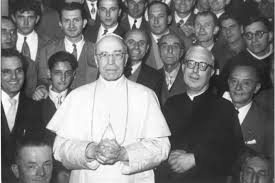
Pope Pius XII called him “Il Microfono di Dio”, “The Microphone of God”. He called for a movement towards a “New World” gathering many people behind him and a growing group of supporters. It was Pope Pius who renamed the movement for a “Better World”, recognizing it on February 10, 1952 the document the “Proclamation for a Better World”.
Published by
COMMUNITY ANIMATION SERVICE PNG, pp. 229.
PO Box 54
Mt Hagen, WHP, Papua New Guinea
Our Parishes Formation Team support visit to Randwick
Our Parishes Formation Team support visit to Randwick
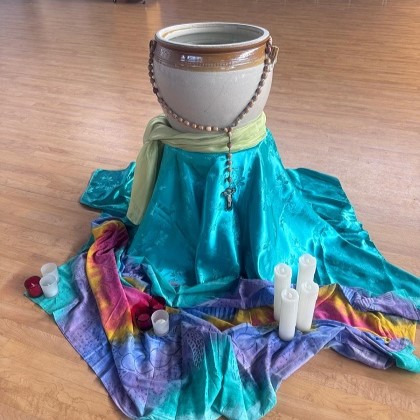
Dominic Gleeson writes:
"On the weekend of 8-10 November the MSC Parishes Formation Team, (Dominic Gleeson, msc, Marian England, Dcn Michael Hangan) visited Sacred Heart Parish as a support visit to the MSC parish team, (Pat Mara,msc, Bill Brady, msc, Michael Nithan,msc, Julsen, msc) and to offer the parish a retreat.
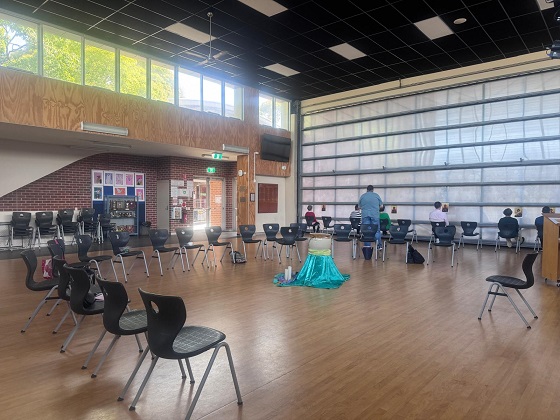
We began by inviting participants to gradually become aware of their lived experience - now - and we led the group in a number of contemplative prayer styles, filtered through with ample opportunity for silence, reflection and some group sharing. We were able to create an atmosphere of trust and healing and concluded the retreat with a discovery of a new awareness of our journey in God and the mission that God was affirming in us and calling us into."
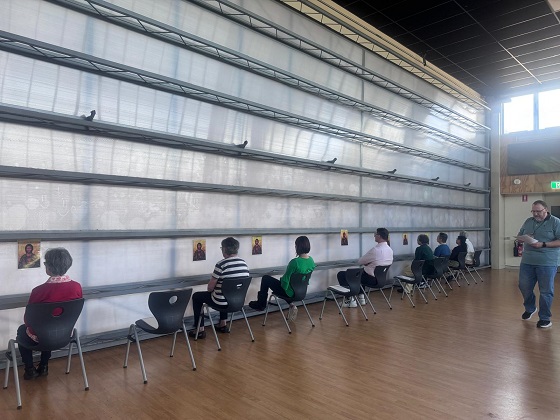
An important note:
Not all our visitors know that the name of the parish has now changed from Our Lady of the Sacred Heart Parish to Sacred Heart Parish due to its incorporation with St Margaret Mary parish at North Randwick. Each church will retain its individual name, eg., OLSH Randwick and St Margaret Mary, North Randwick but the parish is now called Sacred Heart Parish, Randwick.
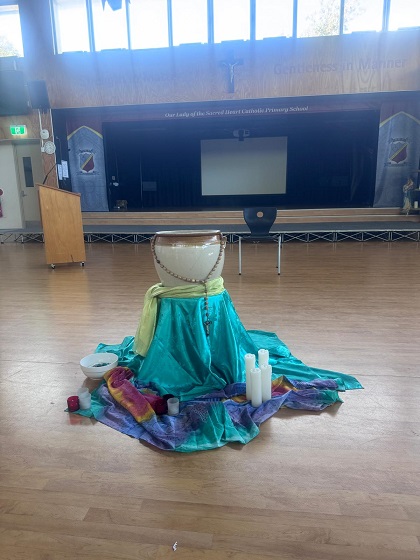
Some Significant November Days for the Chevalier Family 2024
Some Significant November Days for the Chevalier Family 2024
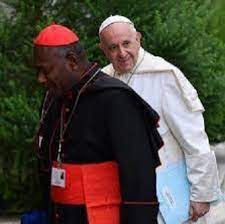
So many of this month’s dates concern MSC mission foundations.
And, the beginning of the Novena to Our Lady for the founding of the congregation, November 30th
1 November, 1880
Abbe Rene-Marie Lannuzel celebrates the first Mass in the colony of Port-Breton, PNG.
1 November, 1883
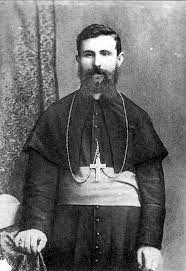
Henry Verjus is ordained priest in Rome.
1 November 1885
First edition of Belgian Animals (French and Dutch version).
1 November, 1902
Arrival of the first MSC Sisters in Vunapope , New, Pomerania, PNG.
1 November, 1955
The first Mass is celebrated in the new MSC Generalate at Via Asmara 11, Rome. xxxxx
1 November, 1956
Father Alex Smulders MSC is appointed Provincial Administrator in the Philippines.
1 November, 1981
Erection of the MSC District in Cameroun, entrusted to the French Province.
2 November, 1964
Father Karl Maria Weber was killed in the diocese of Ikela. (Zaïre at that time, now Democratic Republic of Congo). In this period of upheaval, 13 Sisters, 7 Fathers and 2 Brothers were abducted by the rebels.
2 November, 1988
Of 57 Spanish MSC who died since the beginning of the Province, 19 were killed, which is exactly one third.
4 November, 1979
The first 2 Japanese MSC, Makino Makoto and Sadami Takayama, make their first profession. The first FDNSC, Akie, made her perpetual profession 17 March 2012.
5 November, 1880
The MSC Community is expelled from Issoudun and the doors of the Basilica are sealed. Father Piperon and the novices at the time find a new home in "Huize Gerra" Haaren, The Netherlands. They arrive 12 November, 1880.
5 November, 1880
First MSC foundation in Barcelona, Spain.
5 November, 1953
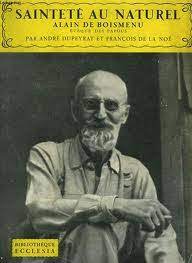
Bishop Alain de Boismenu dies at Kubuna, Papua New Guinea.
6 November, 1855
Birth of Father P. Barral at Moutiers, Savoie. He was among those who began the MSC House at Salzburg, Austria, founded the Missionary Society of Bethlehem and Switzerland, and the Poor Missionary Sisters of Bethlehem.
6 November, 1891
First visit to the Marshall Islands: Father Bontemps and Brother C.Weber, missionaries in the Gilbert Islands, visit the island of Jaluit. Map bothxxxx
6 November, 1898
First Belgian MSC Brother, Jan Lasters, leaves Issoudun for Gilbert Islands Mission (Kiribati).
6. November 1936
Celebration of the MSC martyrs of Canet del Mar.
8 November, 1880
Father Piperon and his novices leave for the Netherlands and find a home in “Huize Gerra”, Haaren.
8 November, 1934
The International Scholastic it in Rome leaves Via Torino and establish its itself in Via Aventina 3.
8 November, 1953
In the Issoudun Basilica, the first four MSC sent into Senegal. Father Theophile Cadoux MSC, France, is their Superior.
9 November, 1944
55 Dutch MSC are evacuated by the American army from Berg en Dal to Tilburg.
9 November, 1975
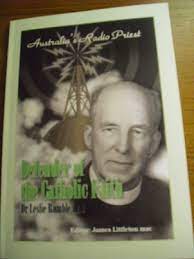
Father Leslie Rumble MSC, Australia, famous radio priest and apologist, dies in Sydney.
10 November, 1910
Father Joseph Stettner MSC, Germany, arrives in the USA and establishes the house in La Crosse, Wisconsin.
10 November, 1939
Surigao, Philippines, where the MSC worked since 1908, becomes a diocese.
10 November, 1959.
The Vicariate of Coquilhatville, Zaire, becomes an Archdiocese. Msgr H. Vermeiren MSC appointed Archbishop. In 1966 the name was changed to the Archdiocese of Mbandaka; in 1975 to the Archdiocese of Mbandaka-Bikoro.
11 November, 1855
Abbe Crozat blesses a new bell for the Chapel of the two MSC fathers in Issoudun.
11 November, 1949
Death of Father Christian Jansen at Boppard, Germany. He was Superior General from 1932-1947.
11 November, 1956
Eastern Papua Mission (Sideia) entrusted to the Australian MSC, becomes a Vicariate.
11 November, 1961
Father Josef Weigel MSC, Austria, appointed first Bishop of Ikela, Zaire, ordained at Regensburg, Germany.
12 November, 1969
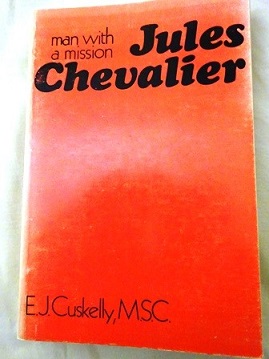
Father Eugene J. Cuskelly is elected Superior General of the MSCs (1969-1981). Cuskelly is the author of Jules Chevalier Man With a Mission, and today he is well appreciated for his response to Vatican II for all congregations to return to their roots and charism. He re-discovered the person of Jules Chevalier for the Chevalier Family and, with his council, introduced the now globally-used-expression "Spirituality of the Heart".
13 November, 1881
The municipal council of Issoudun ask the Minister to depose the “Cure Chevalier” who is “Jesuit, expelled an enemy of the government.”
13 November, 1892
Bishop Henri Verjus died in his birth-place in Oleggio, Italy. He was ordained on 1 November, 1883, and in the short period of time between his ordination and death, he established the mission on Yule Island, PNG, and was ordained Bishop at a very young age.
14 November, 1869
Father Chevalier arrives in Rome for the fourth time “to save Our Lady of the Sacred Heart”, who had just been crowned at Issoudun, but some objections against the devotion had been made.
14 November, 1893
“Henceforth the Lay Brothers will no longer take a religious name; they are to be called by their family and baptismal name.” (MSC General Council).
14 November, 1922
The Vicariate of New Pomerania, PNG, is now called the Vicariate of Rabaul.
14 November, 1923
The FDNSC Generalate, Mother Gertrude and assistants, return to Issoudun after an exile of 17 years in Belgium.
15 November, 1884
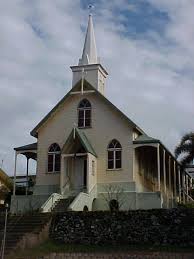
Dedication of the first sanctuary in Thursday Island to Our Lady of the Sacred Heart.
15 November, 1885
First MSC Mass celebrated in the Church at Randwick, Australia.
15 November, 1966
Erection of Ecclesiastical Provinces in New Guinea:
- in Irian Barat, Indonesia: The Ecclesiastical Province of Merauke: Metropolitan Archbishop, Msgr H.Tillemans MSC.
- In Papua New Guinea: the Ecclesiastical Province of Port Moresby: Metropolitan Archbishop, Msgr Virgil Copas MSC; Bishop of Bereina, Msgr E. Klein MSC; Bishop of Sideai, Msgr F.J.Doyle MSC.
- The Ecclesiastical Province of Rabaul: Archbishop: Msgr J. Hoehne MSC; Bishop of Kavieng: A. Stemper MSC.
- Also the Ecclesiastical province of Madang with numerous suffragans of other societies, especially of the SVD.
16 November, 1875
Father Jouet leaves Issoudun to go to Rome.
16 November, 1878
Pope Leo XIII decides the church of St James of the Spaniards in Rome will be dedicated to Our Lady of the Sacred Heart.
16 November, 1969
First General Conference of the MSC, in Rome. This new structure was created by the General Chapter of 1969.
16 November, 1972
The Apostolic Prelature of Louis Trichardt, South Africa, becomes the diocese of Louis Trichardt-Tzaneen. In 1987, its name was changed to Diocese of Tzaneen.
17 November, 1919
Return of MSC’s Sisters from the Marshall Islands to Hiltrup.
18 November, 1934
The new International Scholasticate at Via Aventina is blessed by Cardinal E. Pacelli, later Pope Pius XII, Cardinal Protector of the MSC Society.
19 November, 1884
Marseille: Father Henry Verjus embarks for Papua.
19 November, 1919
Erection of the Apostolic Prelature of Celebes, Sulawesi, Indonesia, Entrusted to the Dutch MSC Province.
19 November, 2016
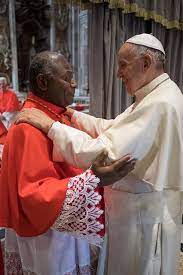
John Ribat MSC, Archbishop of Port Moresby, named a Cardinal.
20 November, 1920
The first 6 novices of the Handmaids of the Lord, founded by Monsignor de Boismenu, make their vows at Kubuna, Papua New Guinea.
20 November, 1921
Arrival of Marie Therese Noblet in Yule Island; she succeeds Sister Marie Bernadette Koopman FDNSC, as Superior of the Handmaids.
21 November, 1875
Father Victor Jouët arrived in Rome, where he remained until he died in 1912.
He was first buried in a family tomb in Marseille, France. In 2003 his remains were transferred to the Crypt in Issoudun, where he now rests with Father Chevalier and other early founding members.
21 November, 1957
Erection of the Prelature of Caraveli, Peru, with Father F. Kaiser MSC, Germany, as first Prelate.
21 November, 1986
Pope John Paul II spends the night of the MSC House in Suva, Fiji.
22 November, 1808
Birth of Jean-Marie Vandel at Nernier, Savoie, France.
22 November, 1962
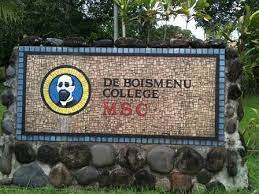
Canonical erection of de Boismenu College, Bomana, PNG.
23 November, 1892
An example of a flourishing novitiate of Brothers: “on the recommendation of Father Grinsven, Director of the novitiate at Antwerp, four Brothers are accepted for their first profession and six Brothers postulants for the taking of the habit.” (MSC General Council)
24 November, 1897
Father E. Bontemps, MSC, founder of the mission in the Gilbert Islands, today known as Kiribati, died on the island of Nonouti, Kiribati.
25 November, 1908
The first MSC arrive in Manila, Philippines, to start Surigao mission, entrusted to the Dutch MSC
26 November, 1928
Father Joseph Winkleman, Germany, is killed at Malongki, China.
26 November, 1937
The MSC except a Vicariate of eight parishes in the province of Nueva Ecija, Philippines.
28 November, 1869
From November 28 to December 4, Father Chevalier is in Naples for a second visit to the Third Order founded by Blessed Catarina Volpicelli.
28 November, 1903
Arrival of the first MSC in the Ki Islands, Indonesia
29 November, 1932
The first four MSC Sisters depart Germany for China!
30 November, 1854
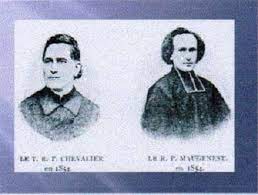
Father Chevalier and Father Maugenest begin their novena to Our Lady. This novena begins a most remarkable story of faith, courage and passion ~
A passion for the Heart of Christ!
A passion for the heart of humanity!
A passion for mission to the ends of the earth!
